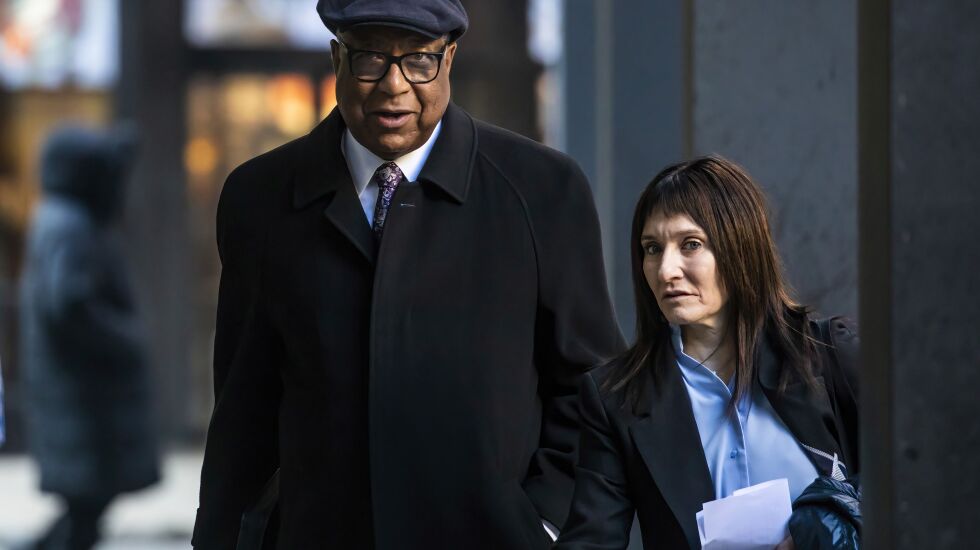
Michael J. Madigan couldn’t be bothered to call one of his top deputies, who had decades of experience in the legislature, to tell him it was time to step down over a brewing allegation of misconduct that might go public.
So the powerful Illinois House speaker got on the phone with his key emissary, Michael McClain, to talk about longtime state Rep. Lou Lang.
“So when do you want me to call Lang and just lower the boom on him,” McClain said. “Because he’s not getting, he’s not getting it.”
Turns out, the FBI was listening back in 2018.

For the first time Thursday, jurors in the bribery trial of McClain and three other political power players heard Madigan’s voice on secret recordings, some of which were made as Lang was being pushed to resign after three decades in the Illinois legislature.
The recordings offered a behind-the-scenes look at one of the #MeToo scandals that roiled the statehouse. It also amounted to an embarrassing episode Thursday for Lang, who sat stone-faced on the witness stand as jurors listened to the call in which McClain told him it was time to resign.
“That is bullsh—,” Lang told McClain on Nov. 8, 2018. “But in the, in the environment in which we are today, doesn’t really matter if it’s bullsh— or not, does it?.”
It also amounted to key evidence in the trial because McClain told Lang he was calling as “an agent, somebody that cares deeply about ya.” McClain and others are on trial for allegedly trying to sway Madigan to benefit ComEd by landing jobs, contracts and money for Madigan’s associates, and the feds say McClain passed along Madigan’s demands.
Also on trial are former ComEd CEO Anne Pramaggiore, ex-ComEd lobbyist John Hooker and onetime City Club President Jay Doherty. Madigan resigned from the legislature in 2021, and since last year has faced a separate indictment for racketeering.

His trial is set for April 2024.
Lang, a Democrat from Skokie, was stripped of his leadership posts in 2018 amid a woman’s claims that he repeatedly harassed, intimidated and retaliated against her — all allegations Lang at the time dismissed as “absurdities.”
He was later cleared of harassment allegations by the state’s acting legislative inspector general — and left the Illinois House in January 2019 to join a prominent Republican-led consulting and lobbying firm.
The tapes show Madigan, through McClain and others, kept up the pressure for Lang to resign as another woman threatened to go public if Lang was rewarded with a leadership position.
In one call, Madigan told McClain that Lang’s accuser did not cooperate with the inspector general’s investigation, which he said caught his attention. He also made reference to the other potential allegation against Lang.
“Anyhow, you’ve told me that [state Rep. Anna] Moeller’s got an email where Lang is inviting some woman to come to his room to talk about her bill,” Madigan said. “Would you be willing to sit down with Lang and, and, and however you want to do it, just you know, tell Lang, ‘Hey, whoa. You know you haven’t cleared (unintelligible).’”
Madigan added of Lang, “I think the guy’s gonna be a continuing problem. That’s my expectation.”
Lang eventually told McClain he’d “give this some thought” and that “I wouldn’t do anything to damage my speaker or my caucus. He’s been very good to me. And I’m not gonna do anything nasty to him. So, let me think about this.”
Lang said he later did meet with Madigan, who “affirmed that this was his point of view and that, as far as he was concerned, my leadership had come to the end of the line.”
Though it’s not clear what came of the second allegation, Lang maintained his innocence on the witness stand. In fact, during cross-examination by McClain attorney Patrick Cotter, Lang insisted “I was not facing sexual harassment charges.”
“And I tell you right here in federal court that I resent the allegation,” Lang said. “And the inference.”
Lang testified that McClain used various monikers to describe Madigan, not only “Mike” or “the speaker,” but also “our friend.”
“Sometimes he called him, Himself,” Lang said. “As if it had a capital H.”
Despite the gravity of the request McClain made in November 2018, Lang said he was not surprised to get the message from McClain — who was then a ComEd lobbyist — and not Madigan himself.
“Because Mr. McClain was the person who was often sent by the speaker to talk to members about various issues involving the workings and operations of the Illinois House of Representatives,” Lang told prosecutors.

Other revelations in the trial Thursday included details of the FBI’s approach to ComEd executive Fidel Marquez on Jan. 16, 2019. FBI special agent Ryan McDonald told jurors that he and another agent, dressed in suits, visited Marquez at a family member’s home around 6 a.m. that day.
McDonald said they played tapes for Marquez. In one, the agent said Marquez had been caught discussing allies of Madigan who were being paid by ComEd through Doherty’s company. In another, Marquez was allegedly heard discussing efforts by Madigan to install former McPier boss Juan Ochoa on the ComEd board.
McDonald said they moved the discussion to a strip mall parking lot when people in the home began to wake up. Marquez ultimately agreed to cooperate with the feds and make recordings of his colleagues that became key to the feds’ case.
Also Thursday, two former state legislators testified that they experienced retribution of sorts for their displays of independence against Madigan — as prosecutors highlighted the mighty power the speaker yielded over his House members.
Former state Rep. Scott Drury told jurors he was unable to pass any bills through the Illinois House during his third term after he voted “present” for Madigan’s speakership in 2017.
And former state Rep. Carol Sente, who served in the Illinois General Assembly from 2009 to 2019, testified that she believed she lost a chairmanship title for a House committee because she introduced a term-limit bill that would have impacted Madigan’s record-setting speaker leadership.
But McClain attorney David Niemeier questioned Sente about whether it was reasonable for members of a political party to face consequences if they take a position out of line with the party.
“This is all politics, isn’t it, Ms. Sente?” he asks.
“So I learned,” she said.








